
|
|
Notes: Mirrored from h-net.org. |
1. Persian section
Provisional translation by Juan Cole
Tablet of the Holy Mariner (Persian)
He is the Foreigner, the Persian, the Iraqi.
When the passengers on the divine ark had clung to one of the names, with the permission of the holy mariner in the pre-existent vessel, then did it set sail upon the sea of names. They traversed the stations of limitation, so that they might make for the Yemen of the powerful sovereign of oneness, arriving at the shore of divine unity. Thus might they drink from the chalice of transcendence. Indeed, by the aid of the lord, that eternal ark set sail upon and plied the spiritual waters of wisdom.
Then they reached a place where the name, the Still, became dominant over their course, so that the ship of the spirit was becalmed, unable to move. At that moment, the impregnable command of the lord descended from the holy and everlasting heavens. The mariner of eternity was ordered to teach a single letter of the hidden word to the people of the ark. Thus did they, by the succor of the Unseen, pass through the valley of psychological bewilderment and arrive at the great court of spiritual unity, attaining the Mount Qaf of eternal life and the presence of the lord of souls. When the people of the ship attained to the word of the spiritual friend, they were immediately filled with meaning and soared into the sacred sky. By the divine grace and mercy, they passed beyond the peaks of carnal desire and the deepest levels of negligence and blindness. At that moment the breezes of paradise wafted upon their bodies from the sanctuary of the All Merciful. After they soared in the heavens of divine nearness, they traversed the spiritual stations in the place of safety and security. Finally, they halted at the homeland of lovers. The inhabitants of this station arose to serve them and show them kindness. The immortal attendants and the holy servers poured ruby wine liberally. Intoxication with the wine of divine knowledge, and the cup of eternal wisdom induced such love and distraction that they escaped from their own being and that of existing things. They gave their hearts to the beauty of the friend. For ages and centuries they settled and dwelt in that pleasant and spiritual station, in that divine and holy rose garden, with perfect joy and happiness.
Then the gales of divine tests and the winds of lordly temptation blew from the Sheba of the everlasting Cause. They became distracted by the beauty of the wine server and grew heedless of the immortal countenance, to the extent that they imagined the shadow to be the sun and phantoms to be light. They set out for the ladders of the greatest name so that they might scale those heavens and arrive at that seat and place. When they rose toward it, the divine assayers descended upon them with the sacred touchstone, by the irresistible decree of the lord. When these emissaries did not perceive the scent of the spiritual youth, they forbade entry to all. Afterwards, there occurred what is inscribed upon the guarded tablet.
Then, you who dwell upon the plain of divine love and drink the wine of unceasing forgiveness, do not exchange nearness to the beauty of the friend for both worlds. Do not prefer the presence of the wine server to meeting him, and do not give your heart to the intoxicant of ignorance and heedlessness in preference to his wine of knowledge and wisdom. Lips are for mentioning the beloved; do not defile them with filthy water. The heart is the home of everlasting mysteries, do not busy it with perishable things. Seek the water of life from the fountain of the beauty of the All-Praised, not from the manifestations of Satan.
Yes, this ephemeral youth here mentions the highest station of the love of the divine friends. He does so by reference to the wonders of the text of divine unity and the gems of the wisdom of the self-sufficient sovereign. Thus, perhaps some might recognize the value of courage and gallantry, and put off the shirt of negligence and carnal appetites. Perhaps they will visit the illumined beauty of the pure, radiant and sanctified friend in the land of love, detachment, amiability and exaltation. Thus would they receive the lights dawning from the morn of his brow and the effulgence of the perspicuous day, to at least the extent that they would be enabled to unite their inner and outer selves. We have passed beyond the loftiness of abstraction, the sublimity of divine oneness, the ultimate recognition that God is above all attributes, and the most great sanctification. Now, they must put forth their utmost effort and give their unswerving attention, so that their inward secrets not be contrary to their overt behavior, nor their outward deeds at variance with their inner mysteries. We have traversed the stage of expending the self for others. Arise to expend justice and fairness upon the souls that pertain to you.
In the end, however, you prefer the cloak of carnal longing and desire to the robe of divine benediction, and you exchange the song of the nightingale of immortality for the disagreeable croaking of death that issues from the throats of the hateful and rebellious. How miserable a trade you make! We are from God and to him do we return. God willing, we maintain the hope that the immortal temples of glory shall, through the adornment of holiness and the divine attributes, appear illumined, gentle, pure and undefiled like the eternal sun. This is not difficult for God.
2. Arabic section
Provisional translation by Juan Cole
Tablet of the Holy Mariner (Arabic)
He is the Precious, the Beloved.
Holy mariner, bring the ship of immortality to the celestial concourse.
Praised be my Lord, the most glorious.
Moor it on the sea of pre-existence by means of a new name.
Praised be my Lord, the most glorious.
Then board upon it the temples of the spirit in the name of God, the exalted, the most high.
Praised be my Lord, the most glorious.
Weigh anchor so that it can ply the ocean of grandeur and deliver its passengers to the precincts of nearness in the sanctuary of eternity.
Praised be my Lord, the most glorious.
Behold, you have brought them to the sacred shore, the beach of the crimson sea.
Praised be my Lord, the most glorious.
Then disembark them from the ship in this ethereal and most hidden station.
Praised be my Lord, the most glorious.
This is a station, wherein God showed forth the fire of beauty in the everlasting bush.
Praised be my Lord, the most glorious.
Therein the temples of the Cause put off the sandals of carnal desire.
Praised be my Lord, the most glorious.
Therein the Moses of grandeur circles with the hosts of eternity.
Praised be my Lord, the most glorious.
This is a station, wherein the hand of God was drawn forth from the cloak of grandeur.
Praised be my Lord, the most glorious.
This is a station, wherein the ship of the Cause shall never move, even though all the divine names be recited to it.
Praised be my Lord, the most glorious.
Then, holy mariner, teach the passengers on the ship what we taught you behind the cloud of unknowability--
Praised be my Lord, the most glorious--
lest they become idled in the valley of the white dune.
Praised be my Lord, the most glorious.
And so that they might fly with the wings of spirit to the station that God has sanctified above mention in the kingdoms of creation--
Praised be my Lord, the most glorious
and might move through the sky like birds of nearness in the realm of the divine presence
Praised be my Lord, the most glorious
and learn the mysteries concealed within the waves of light.
Praised be my Lord, the most glorious.
They traversed the way-stations of worldly limitations, until they arrived at the station of divine unity in the center of guidance.
Praised be my Lord, the most glorious.
They desired to ascend to a station that God ordained to be above their ranks, when the luminous comet expelled them from among the inhabitants of the kingdom of his presence.
Praised be my Lord, the most glorious.
They heard the melodies of greatness from behind the pavilions of the Unseen in the sublime sanctuary.
Praised be my Lord, the most glorious.
Guardian angels, return them to their places in the realm of humanity.
Praised be my Lord, the most glorious.
For they desired to fly into that heaven to which the wings of the dove never attained.
Praised be my Lord, the most glorious.
Nor will the ships of mere conjecture or the hearts of those endued with intellect ever stir therein.
Praised be my Lord, the most glorious.
Behold, the houri of the spirit looked out from the most exalted chamber.
Praised be my Lord, the most glorious.
She arched her eyebrow toward the concourse of holiness.
Praised be my Lord, the most glorious.
The lights of her forehead shone from the earth to the sky.
Praised be my Lord, the most glorious.
The radiance of her beauty fell upon the people of the earth and clay. Then, suddenly, the bodies of being shuddered forth from the graves of annihilation.
Praised be my Lord, the most glorious.
Then she called out with a melody that the ear of hearing had never experienced from pre-existent eternity.
Praised be my Lord, the most glorious.
She said, "By God, those who do not have in their hearts the breezes of love that waft from the radiant `Iraqi youth"
Praised be my Lord, the most glorious
"shall never be able to ascend to the heights of the unknowable essence in this remotest realm."
Praised be my Lord, the most glorious.
Behold, she commanded one of her most beautiful slave girls
Praised be my Lord, the most glorious--
saying, "Descend from the palaces of immortality in the form of a sun in this void"
Praised be my Lord, the most glorious--
"then turn your attention to them, insofar as they have imprisoned him within their hidden, inmost souls"
Praised be my Lord, the most glorious--
"and if you smell the fragrance of the coat of the youth who was concealed within pavilions of light by the wicked"
Praised be my Lord, the most glorious
"then cry out within yourself so that all the embodiments of wealth who inhabit the chambers of paradise may be informed thereof."
Praised be my Lord, the most glorious.
"Thus might all of them descend from the chambers of immortality"
Praised be my Lord, the most glorious
"and kiss their hands and feet insofar as these had soared into the heavens of faithfulness."
Praised be my Lord, the most glorious.
"Perhaps you will discover the scent of the beloved on their shirts."
Praised be my Lord, the most glorious.
Then the houri of nearness dawned from the horizon of the chambers, just as the visage of the youth rises above his robe.
Praised be my Lord, the most glorious.
She descended with an ornament that illumined the heavens and all that is in them.
Praised be my Lord, the most glorious.
Then she moved in the air so that she perfumed all things in the lands of holiness and sublimity.
Praised be my Lord, the most glorious.
When she arrived at that station, she arose like the meridian along the pole of creation.
Praised be my Lord, the most glorious.
She inhaled their scent at that time when there was neither beginning nor end.
Praised be my Lord, the most glorious.
She did not discover in them what she desired, and this is an amazing tale!
Praised be my Lord, the most glorious.
Then she shrieked, and wailed, and returned to her place in her crimson palace.
Praised be my Lord, the most glorious.
Then she spoke a secret word beneath her spiritual breath.
Praised be my Lord, the most glorious.
She called out among the celestial concourse and the houris of eternity.
Praised be my Lord, the most glorious.
By God, she did not perceive from those idle claimants the breezes of fidelity.
Praised be my Lord, the most glorious.
By God, the youth remained in the land of exile, single and alone in the hands of the godless.
Praised be my Lord in the divine realm of sorrow.
Thereafter she wailed within herself in a lamentation that shook the concourse on high and set them to shrieking.
Praised be my Lord, who clad himself in vestments of black.
She fell upon the earth and died, as though she had been called, and had answered the one who called her in the divine realm beyond all knowing. Praised be the one who created her from the essence of chaste modesty.
Praised be my Lord, the most glorious.
Then suddenly those houris came outside, who had never been glimpsed by anyone from among the people of the sublime garden.
Praised be my Lord, the most glorious.
They gathered around her, discovering her body outstretched upon the dust.
Praised be our Lord, the most high.
When they witnessed her condition and learned a single letter of the tales of the youth, they bared their heads, rent their veils, slapped their own faces, put away all frivolity, wept with their eyes, and struck their cheeks with their hands. These are among the secret and most hidden calamities.
Praised be our Lord, the exalted, the most high.
3. Original text
Lawh Mallah al-Quds (Tablet of the Holy Mariner: Arabic and Persian Versions). Written by Bahá'u'lláh 26 March, 1863 (the "fifth day of Naw-Ruz") at Mazra`at al-Washshash outside Baghdad. Version A below (Arabic only) is a single-page manuscript said to be in the hand of `Abdu'l-Bahá. Version B (Arabic and Persian) is from `Abdu'l-Hamid Ishraq-Khavari, ed., Ma'idih-i Asmani, Vol. 4 (Tehran: Bahá'í Publishing Trust, 1973/129 B.E.), pp. 335-341.
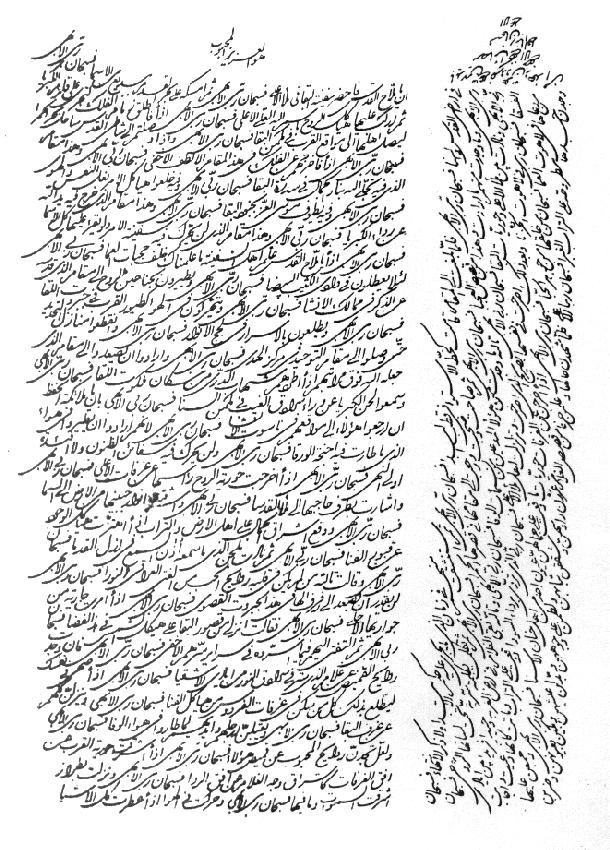
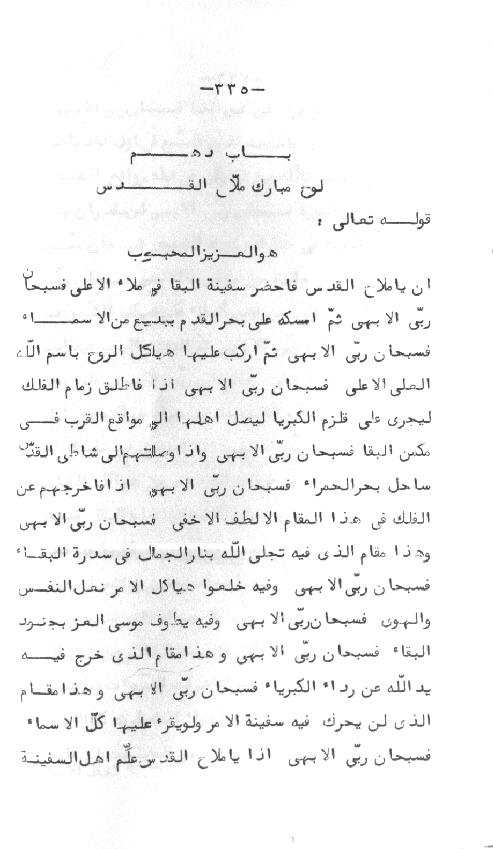
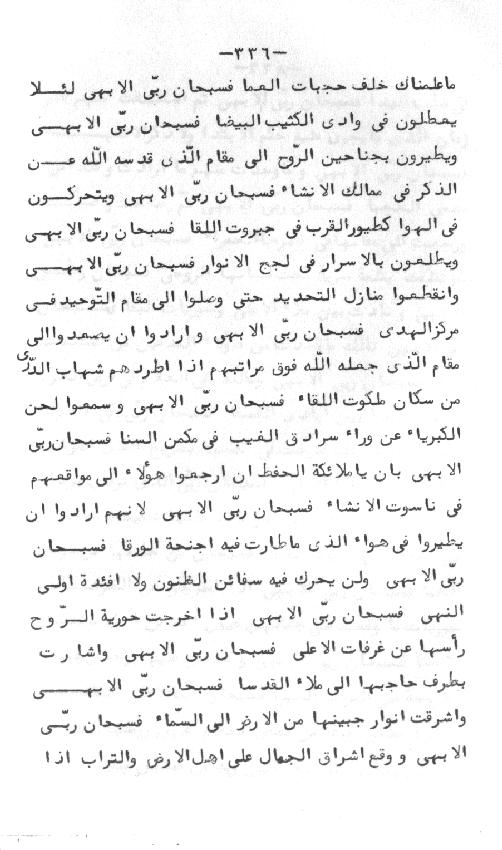
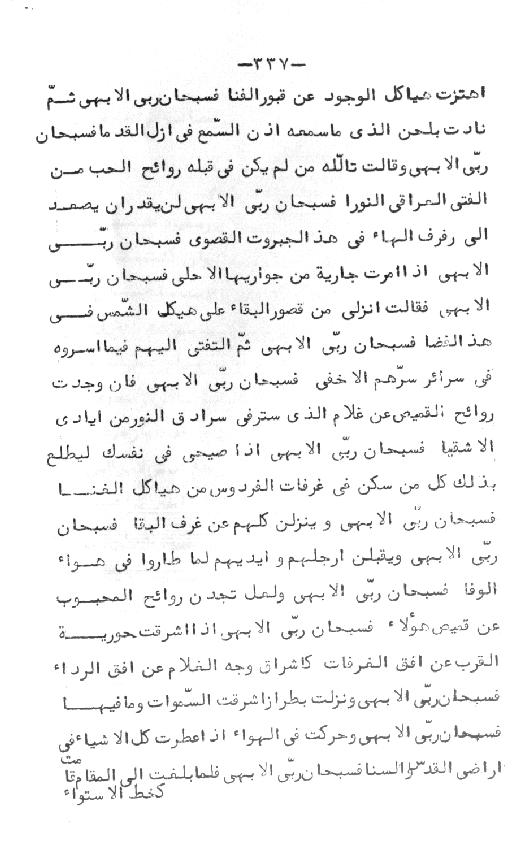
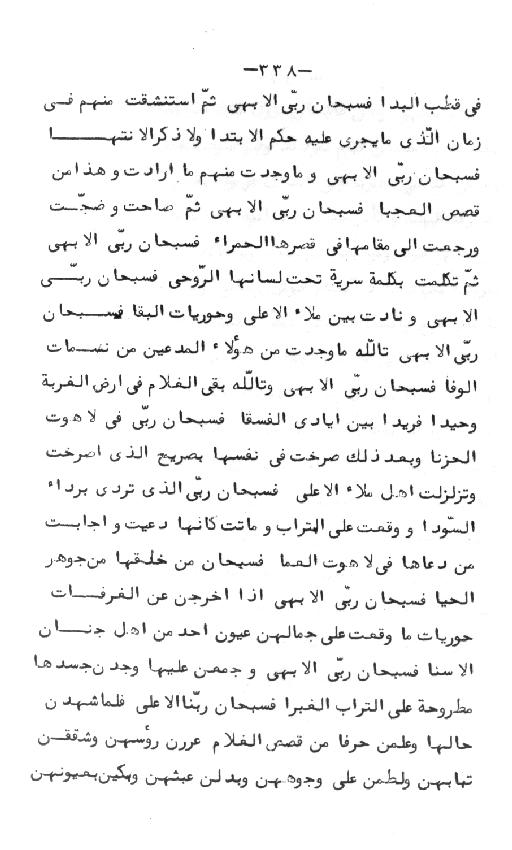
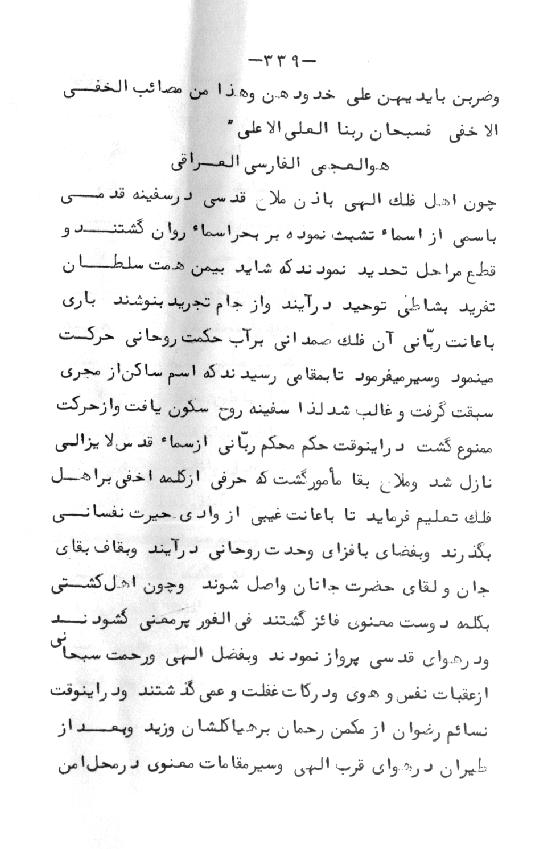
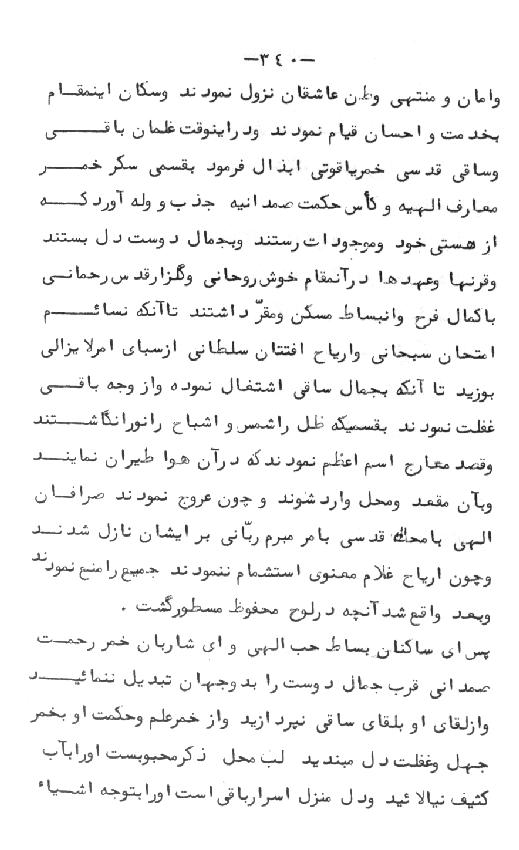
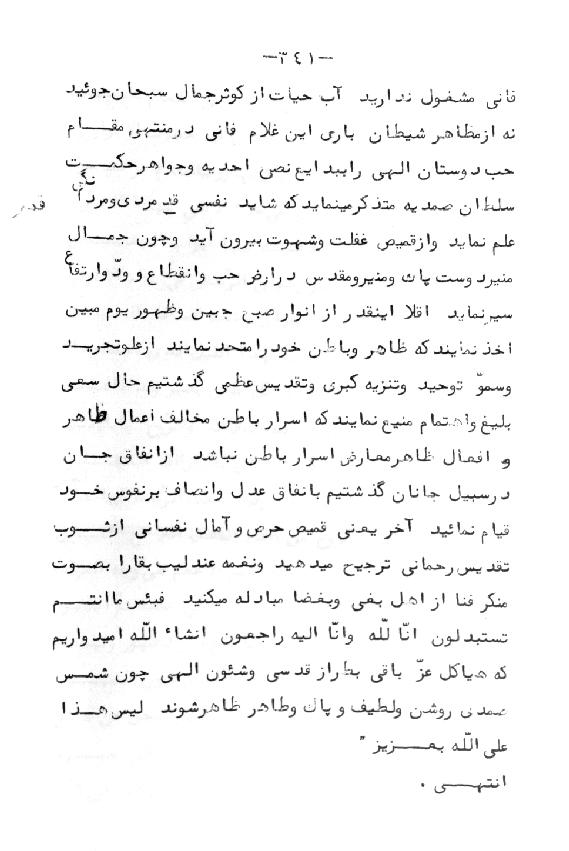
-
1) From Sen McGlinn's "Leiden List":
Arabic section translated Shoghi Effendi and published in many sources, including Prayers for Special Occasions (=Bahá'í Prayers, British) 51-7; MacEoin, 'Rituals' 127-8; as a separate publication see Collins 1.128-9 and references there. Earlier translation in SoW XIII: 4, pp. 75-77 contains misprints.Persian section: draft translation by Shahroakh Monjazeb at 1996 ABS Edmonton(?).
Mention in Selections from the Writings of Abdul-Baha para. 233 (p. 314); discussion God Passes By 147-48; mention ibid. 140; discussion in Taherzadeh, 'Revelation' vol.1 228-243 with full translation of Arabic section; mention ibid vol. 2 6; full treatment in Michael Sours 'Beyond the Mystic Veil' (as yet unpublished); Walbridge, 'Sacred' 159-165, 234; Hatcher, 'Ocean' 39, 49-51, 88-96, 135-137; discussion of historical context John Hatcher 'an Historical-Critical Approach' in SBBR vol. 3 41-42; Balyuzi, 'King' 154; brief discussion Taherzadeh, 'Covenant' 167-68. Discussions of the role of the Maiden in Kamran Ekbal 'The Zoroastrian Heritage' in SBBR vol. 3 155-56; Ross Woodman 'The Inner Dimensions of Revelation' in SBBR vol. 3 347-49, 353-56, 362-64; Paula A. Drewek 'Feminine Forms of the Divine in Bahá'í Scripture' in JBS 5:1 (1992) 20-21; detailed overview of symbolism Christopher Buck 'A Symbolic Profile' JBS 8:4 (1998) 37-44. Included in BWC Best Known.
2) Translator's note:
. . . I have striven for a happy medium between a literal, philological translation and a rendering that seems idiomatic and flows in English. I am glad to hear back as to how well I've done in that regard, and to have suggestions for revision or pointers to where this version seems awkward or unclear.With regard to the substance, it seems to me the 'holy mariner' Tablets combine several motifs in Persian mysticism. The 'mariner' evokes Noah (and the ship is frequently called a 'fulk' or 'ark,' reinforcing this reference). But I wonder if the mariner does not also inevitably evoke Sindbad [of] the 1,001 Nights adventure cycle.
And here the motif of the mariner elides into that of the 'spiritual journey,' as with `Attar's *Parliament of the Birds,* where the thirty birds jointly go in search of their Oversoul, the Simurgh (lit. '30 birds' in New Persian; actually the Simurgh is a late Persian corruption of the Saena Murgha, the ancient Persian mythological bird that flapped its wings to send the seeds of the world-tree flying and so to populate the earth; but it made for a good pun).
Just as in `Attar's fable the spiritual seekers pass through "7 valleys" in search of fulfillment, so do the passengers on the Mariner's ark pass through stages and have adventures in each. They are becalmed at sea for a while; they pass through the valley of bewilderment; they are translated into paradise; they settle in the homeland of the lovers and do serious spiritual partying; but they become attached to the 'bar keeper' there and fail the test of detachment. Then, when they try to journey higher into the heavens, they are stopped because they do not carry the scent of the true Friend.
Bahá'u'lláh ends by 1) holding out the hope that his addressees can attain 'inward and outward unity' (a key mystical concept in his writings that I've never seen systematically analyzed) and 2) lamenting that they probably will choose carnal satisfactions instead.
[This Tablet was written by Bahá'u'lláh on March 26, 1863, during the 13-day Festival of Naw-Ruz, or the Persian New Year, which he celebrated with friends and family in a big tent on a rented property, the Mazra`at al-Washshash, outside Baghdad).
|
|